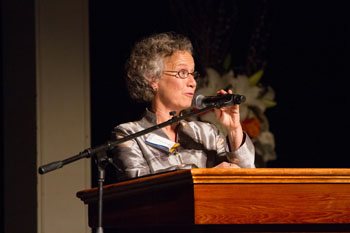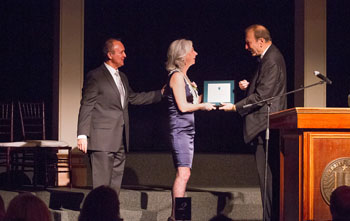Campus News
Extraordinary achievement, social consciousness celebrated at gala event
Honorees of 6th annual Founders Celebration Dinner share one of UCSC’s core goals: ‘Leaving the world a better place’






The honorees at UCSC’s annual Founders Celebration Dinner come from different disciplines and occupations, from astronomy to philanthropy to the world of investigative health reporting.
But each award winner has shown a combination of extraordinary achievement and a strong sense of social consciousness.
The event drew a crowd of 350 people to the Cocoanut Grove in Santa Cruz last Friday night. Like many other Founders celebration events, including the Founders Forum, this year’s dinner sold out early and quickly.
UCSC Chancellor George Blumenthal, on hand to congratulate each award winner, said they all had one key value in common: They are part of a shared quest “to leave the world a better place than when we found it.”
Blumenthal started off the evening by highlighting the latest achievements of the still-young UCSC campus, which will turn 50 three years from now.
“Have you heard our newest distinction?” he said. “Of all the universities around the world under the age of 50, we were recently ranked seventh best. That’s us—young, smart, and beautiful. And modest, too.”
As Blumenthal mentioned the scope and the heft of UCSC’s most recent accomplishments, he also highlighted some of the themes of Founders Celebrations past and present, “from the molten core of the Earth to the depths of the Pacific Ocean, to the most distant objects seen in the universe.”
Master of ceremonies Doug Ley, who is managing partner of local development company Redtree Properties, spoke of UCSC’s key importance to the community and the need to support the UC system.
“I’m a native of this fair city, and a member of the Santa Cruz High School Class of ’69,” Ley said. “The greatest gift this community has ever received was the UC Regents’ decision to start a campus on the Cowell Ranch. Nothing else was even close. Tonight we are gathered to celebrate our shared good fortune.”
The black-tie-optional event was a chance to mingle with educators, faculty, civic leaders, philanthropists, entrepreneurs, pioneer alumni, donors, artists, and journalists while celebrating the founding principles of UC Santa Cruz and recognizing outstanding achievement.
Honored at the event were:
Foundation Medal: Martin Rees, the United Kingdom’s Astronomer Royal, who has just completed eight years as Master of Trinity College, Cambridge. He has been president of the Royal Society, a fellowship of the world’s most eminent scientists, and is a member of the House of Lords. For 10 years he directed the Institute of Astronomy at Cambridge.
Foundation Medal: Gordon and Betty Moore. Gordon Moore is co-founder of Intel Corporation and chairman emeritus of the corporation’s board of directors. A California native, he also co-founded Fairchild Semiconductor in 1957. Moore and his wife, Betty Moore, founded the Gordon and Betty Moore Foundation.
Fiat Lux Award: Philanthropists George Ow Jr. and Gail Michaelis-Ow. George Ow Jr. is a native Santa Cruzan, businessman, publisher, and boogie boarder who spent his early years in the former Chinatown on the banks of the San Lorenzo River. Gail Michaelis-Ow came to Santa Cruz in 1970 to attend UC Santa Cruz and stayed. She is a nurse practitioner at Planned Parenthood and also served on the UC Foundation and Shakespeare Santa Cruz boards.
Alumni Achievement Award: Shannon M. Brownlee. a writer and essayist whose groundbreaking work on health-care issues has appeared in major newspapers and magazines across the country. Her book, Overtreated: Why Too Much Medicine is Making Us Sicker and Poorer, was a semi-finalist for the National Book Award. Her current research focuses on health-care costs and delivery system reform.
Faculty Research Lecturer: Gail Hershatter, is a specialist in modern Chinese social and cultural history who has pioneered field research and oral history among Chinese women. Her books have covered topics including the formation of the working class in Tianjin in Northern China, prostitution in Shanghai, and the construction of socialism in China in the ’50s and ’60s.
In a video presentation, UCSC astronomy and astrophysics faculty hailed the generosity of Martin Rees, along with the heft of his work.
“Martin’s work is always important, never fluff, always luminous, always bright,” astronomy professor Greg Laughlin said. “You know if you study his work, you are going to be rewarded.”
Rees said that it was “a huge pleasure and privilege to be here and listen to half truths being said about me. I always extol the UC system as something we ought to respect far more than the Ivy League. It combines excellence with access and opportunities for everyone.”
He said it was a privilege to have written research papers with seven UCSC faculty members.
Earlier that day, at the sixth annual Foundation Forum, Rees enthralled the audience at the UCSC Music Recital Hall on campus with a talk that examined the 21st century from a cosmic perspective.
Brownlee took to the stage to accept her UCSC Alumni Association Award after a brief video showed some of her career highlights as a writer. In an on-screen interview, John Wilkes, founding director of UCSC’s Science Communication Program, praised the drive and focus of Brownlee, one of his former students.
“She got it right away,” he said. She went right to the heart of the story.” He also praised her fearlessness toward the medical establishment.
A biographical video showcased the achievements of Faculty Research Lecturer award winner Gail Hershatter. William Ladusaw, dean of humanities, called her “the paradigm of UCSC faculty—an outstanding researcher and professor.” Joe Konopelski, chair of the Academic Senate, praised her for “listening to those who have been ignored.”
Hershatter thanked UCSC for providing “the most intellectually stimulating environment I’ve ever been in.”
The evening was also a chance to recognize those whose generosity makes groundbreaking research possible at UCSC. The Ows were praised for their support of scholarships and the arts, and, in particular, Shakespeare Santa Cruz, while the Moores were praised for advancing knowledge by funding valuable scientific research at UCSC. A grant from the Gordon and Betty Moore foundation established UCSC’s Laboratory for Adaptive Optics.